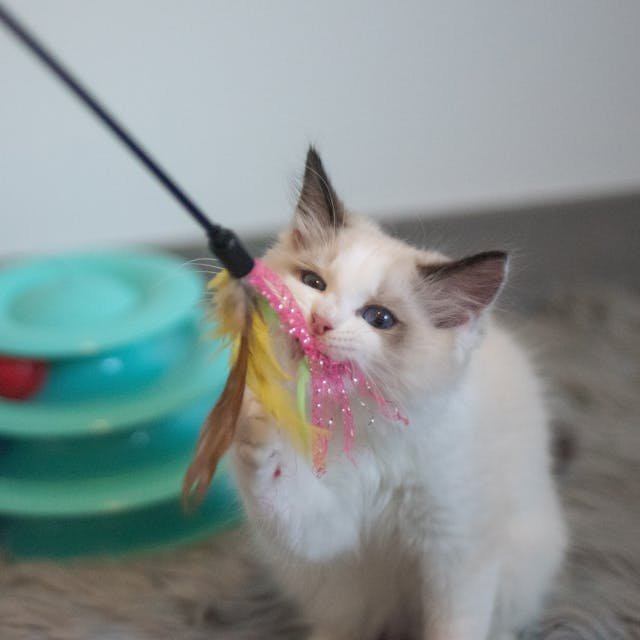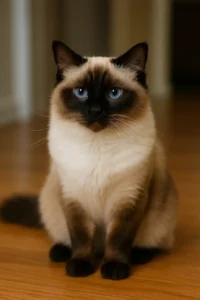
A chocolate point ragdoll just landed on my keyboard again. Typical. They love warmth, attention, and typing nonsense. But behind those soft paws and rich brown markings is a breed that brings more than cuteness—they bring calm, companionship, and a silky fur coat that tells a whole story.
What Is a Chocolate Point Ragdoll?
A chocolate point ragdoll is a color variation within the Ragdoll breed. The term “point” refers to the darker coloring on their ears, face, paws, and tail, while the rest of their coat is usually ivory or cream. Think hot cocoa with a dollop of whipped cream—that’s their color palette.
These cats are known for their calm temperament, loving nature, and laid-back personalities. They often follow you around like a dog and melt into your arms when picked up—hence the name “Ragdoll.”
Key Features of Chocolate Point Ragdoll
- Color Pattern: Rich brown markings on face, ears, paws, and tail
- Coat Texture: Soft, semi-long, and creamy-colored bodies
- Eye Color: Usually blue
- Personality: Gentle, affectionate, sometimes comically lazy
One fun fact? Their coloring evolves. Ragdoll kittens are born nearly white, but their coat darkens as they age, revealing deeper chocolate tones over time.
Chocolate Mitted Ragdoll
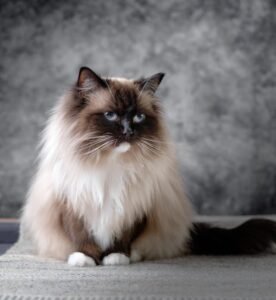
The Chocolate Mitted Ragdoll appears to be wearing tiny white socks. With dark chocolate points on the ears, face, and tail, what sets this variety apart is the white chin and front paws—also known as “mittens.”
Unlike the Chocolate Point Ragdoll, which has no white on its legs, the Chocolate Mitted Ragdoll features a more symmetrical, tuxedo-like appearance. They’re relatively rare and even more striking in person.
Chocolate Bicolor Ragdoll
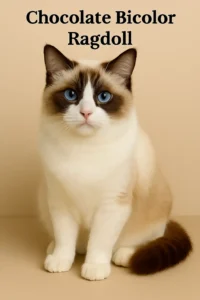
The Chocolate Bicolor Ragdoll is the flashiest of the bunch. It has a white inverted “V” on the face, white legs, and belly, while its ears and tail stay rich brown.
Compared to the Chocolate Mitted Ragdoll, this pattern is more heavily white, especially around the nose and mouth. If you’re looking for a clean, symmetrical appearance, Chocolate Bicolor Ragdolls are ideal—although they’re harder to find.
Chocolate Lynx Ragdoll
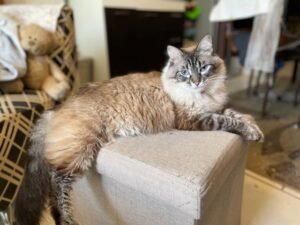
Then there’s the showstopper—the Chocolate Lynx Ragdoll. The term “lynx” means tabby-like striping on the points: ears, face, legs, and tail. These stripes give them a wild look, paired with the breed’s signature sweetness.
Chocolate Lynx Mitted Ragdoll

The Chocolate Lynx Mitted Ragdoll combines white mittens and tabby markings. Their white chins and paws soften the contrast of the dark striping, creating an adorably unique combination.
Chocolate Point Lynx Ragdoll
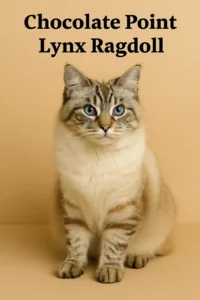
The Chocolate Point Lynx Ragdoll has bold striping over the typical chocolate point markings. Their entire face and legs carry those tabby patterns, making them stand out even among other lynx types.
Chocolate Lynx Bicolor Ragdoll
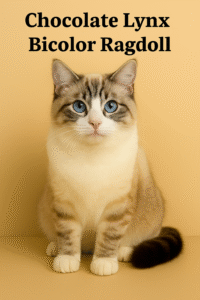
A rarer sight, the Chocolate Lynx Bicolor Ragdoll adds the lynx striping to the bicolor pattern—striped ears and tail paired with that classic white blaze and belly. It’s an intricate pattern and a real eye-catcher.
Chocolate Mink Ragdoll
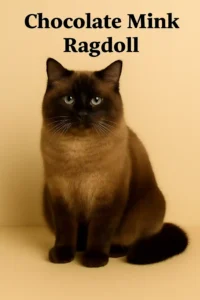
The Chocolate Mink Ragdoll has a deeper, richer tone throughout the coat. The fur is softer, denser, and flatter than traditional Ragdoll coats, giving it a sleek, almost velvet-like feel.
Many Chocolate Mink Ragdolls have green or aqua eyes, which raises some questions about their purebred status among breeders. Still, they’re recognized by many associations and adored by those who love rare Ragdoll varieties.
Teddy the Seal Sepia Ragdoll
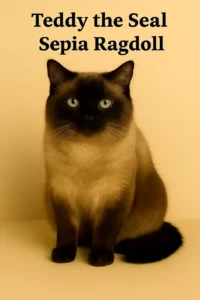
Teddy is a Seal Sepia Ragdoll, which is often grouped with Chocolate Mink Ragdolls due to their dark coat and softer fur. His eyes are green—a trait usually found in Sepia Ragdolls—and his jacket darkened with age.
Like many Chocolate Mink Ragdoll kittens, Teddy’s chocolate markings became more distinct over time, while his fur turned fluffier and his features more defined.
Solid Chocolate Ragdoll
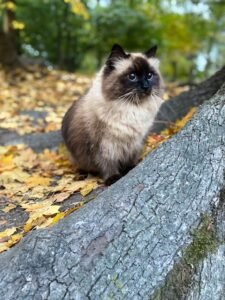
Yes, they exist—though rarely. The Solid Chocolate Ragdoll features an even, rich chocolate coat that extends from head to tail. No points, no patches—just one deep tone. Some have copper or green eyes, depending on lineage.
These are often mistaken for Seal Sepia Ragdolls, especially when the points are subtle. However, with the right breeder, you can find a verified Solid Chocolate Ragdoll backed by pedigree certificates.
Grooming and Coat Care Tips
The coat of a chocolate point ragdoll is semi-long and silky, but it requires regular maintenance.
Here’s what works best:
- Brush 2–3 times a week to reduce matting
- Use a stainless steel comb for the undercoat
- Trim nails monthly
- Check ears and wipe gently if wax builds up
Compared to Chocolate Mink Ragdoll cats, whose coats are flatter and more prone to matting, chocolate point ragdoll cats usually require moderate grooming. Still, a routine helps keep their fur soft and their skin healthy.
Finding a Chocolate Point Ragdoll Kitten
Are you looking to add one to your family? Here’s how to find chocolate ragdoll kittens from trusted sources:
- Search breeder directories via TICA and CFA
- Join niche Facebook groups focused on Ragdoll cats
- Visit cat shows to meet breeders in person
- Ask for pedigree certificates to verify lineage
Why You’ll Love a Chocolate Point Ragdoll
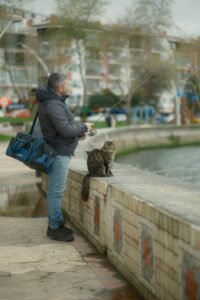
Their personality is the icing on the cake. These cats:
- Play fetch like a dog
- Enjoy belly rubs (rare for cats)
- They are known for their “zoomies”—quick, energetic bursts of play
- I love cuddling and relaxing on your lap
With a chocolate point Ragdoll, you’re not just getting a pet. You are getting a warm, affectionate companion who greets you at the door and stays by your side.
Conclusion
The chocolate point ragdoll offers charm, color, and companionship all in one fluffy bundle. If you are ready for a loyal, low-drama feline friend, this might be your perfect match. Start your search today—your lap is waiting.

